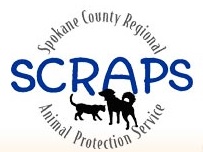
 Senior animals are some of the hardest to adopt out at SCRAPS. Not because of the dog or cat themselves, but because most people have in mind adopting a puppy or kitten rather than a mature companion. That’s a shame. Some of the most wonderful animals they have there at the shelter are classified as seniors.
Senior animals are some of the hardest to adopt out at SCRAPS. Not because of the dog or cat themselves, but because most people have in mind adopting a puppy or kitten rather than a mature companion. That’s a shame. Some of the most wonderful animals they have there at the shelter are classified as seniors.
What is a ‘senior’?
According to most veterinarians, a dog falls into the ‘senior’ category around age seven. The size of the a dog, however, affects this categorization. Smaller dogs mature slower and become seniors later in life than larger dogs. Cats are classified as seniors around the age of nine. Animal shelters are filled with healthy and active senior animals that are in need of a home.
Here are some reasons you should consider adopting an older animal:
Find Your Match
Dogs and cats in their golden years have fully developed personalities, which makes it easy to determine whether they’ll mesh with your household’s current inhabitants. If you already have a cat and need your adoptive dog to get along with cats, again, you’ll have a much better chance of finding an older adoptive dog who is a perfect companion for your family.
Custom Order Your Senior
If you’re looking for a short-haired cat, for example, or a kitty with no history of dental disease, you can search until you find an older pet with exactly those attributes.
Skip House-training
Unlike kittens that sleep or play in their litter boxes, older cats only use it for its intended purpose and are more fastidious about grooming afterward. Likewise, older dogs often know how to ask to be let outside and are less likely to have an accident.

Teach Them New Tricks
Older dogs and cats are great at focusing on you – and on the task at hand – because they’re calmer than youngsters. Plus, all those years of experience reading humans can help them quickly figure out how to do what you’re asking.
Gain an Instant Cuddle Buddy
While a young dog or cat’s high energy level demands lots of activity and exercise, senior pets often prefer cuddling with their pet parents. Although playtime is still a must, the best part of the day is nap-time, and they’re often more than willing to share the experience.
They Settle in Quickly
Older dogs have been around the block and have already learned what it takes to get along with others and become part of a pack. They’ll be part of the family in no time! Most older dogs are potty-trained and have mastered the basic commands such as “sit”, “stay”, “come”, and “down”. Adopting an already-trained dog will save you a lot of time and energy that you’d normally have to dedicate towards training a young dog.
Senior Pets are Less Destructive
Most older adoptive pets are well past the search-and-destroy phase. You don’t need to worry so much about finding your favorite pair of shoes or a table leg chewed beyond recognition. Chances are your senior kitty has no urge to overturn your potted plant or shred the handmade quilt your grandma gave you.
They Are Grateful for Your Kindness
Somehow, older pets seem to know you gave them a home when no one else would. Many new owners form a close bond very quickly with their senior dog or cat, because the pet shows them a level of attention and devotion that is unique to older adopted animals.
You Become a Super Hero
Shelters are overcrowded and unfortunately, older cats and dogs are among the last adopted. By giving them a home, you’re getting years of unconditional love and more emotional rewards than you can imagine.
With November being Adopt-a-Senior-Pet Month, it’s the perfect time to bring an older dog or cat into your home and family!
SOURCE – SCRAPS release, November 2017



